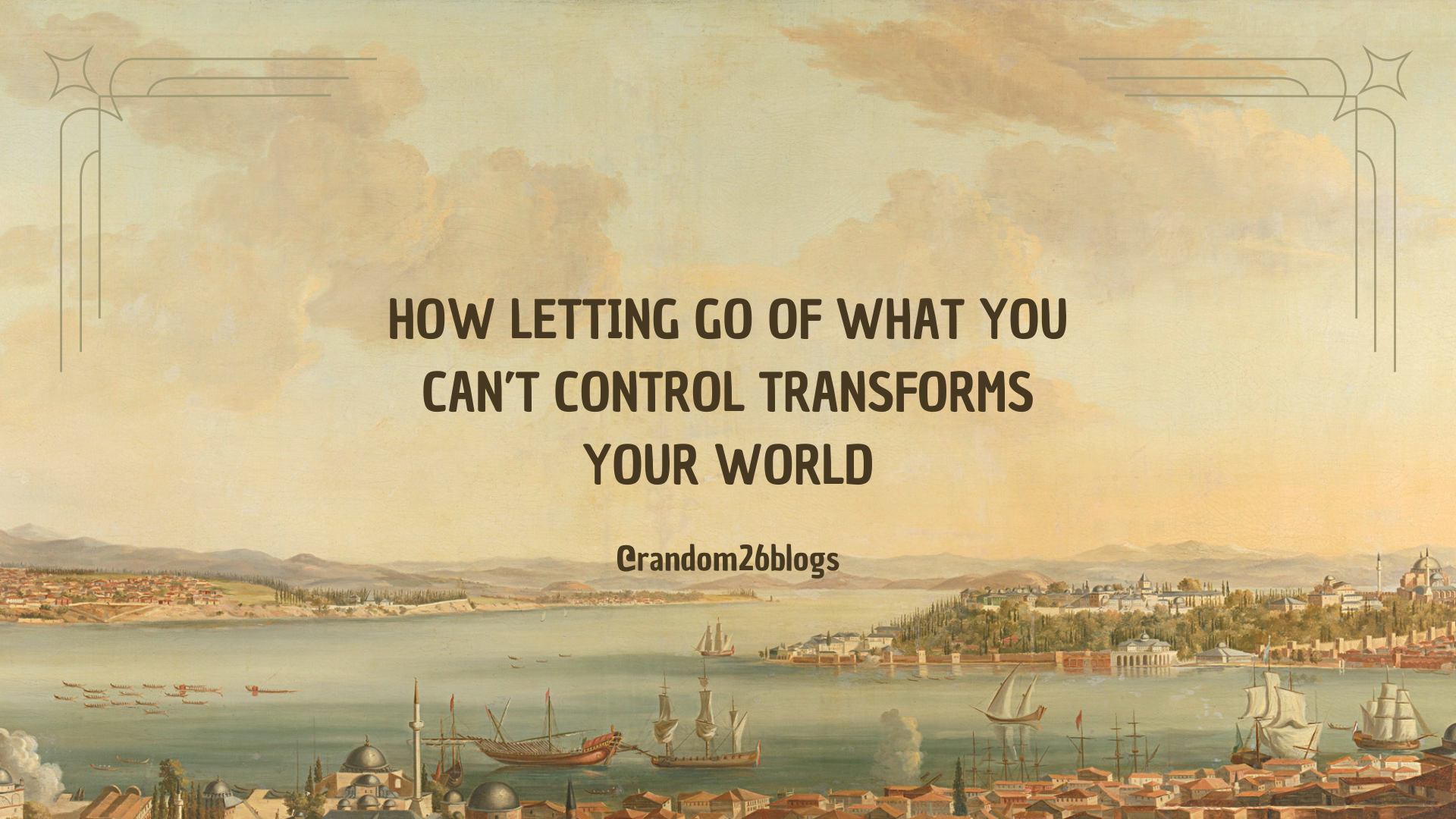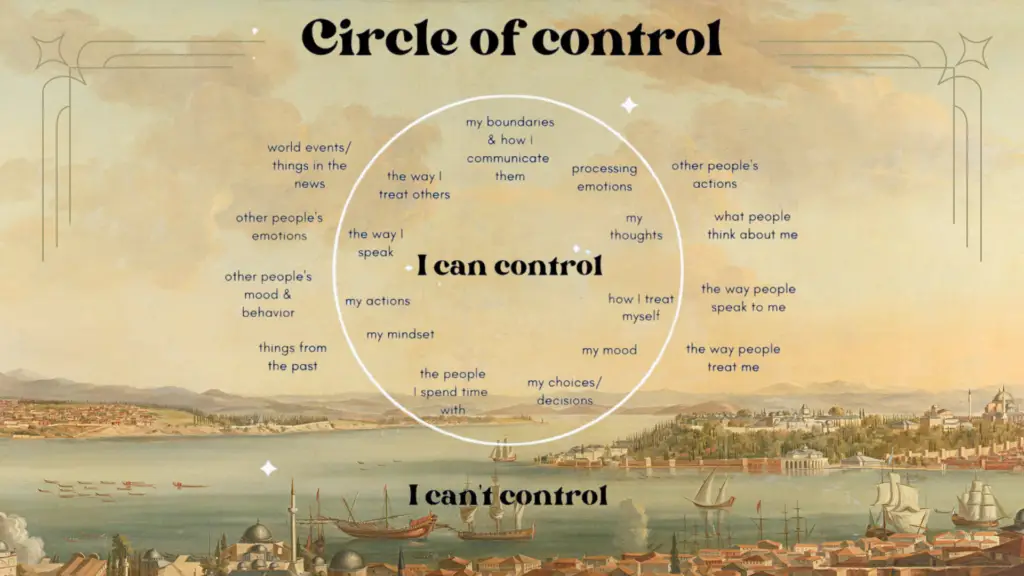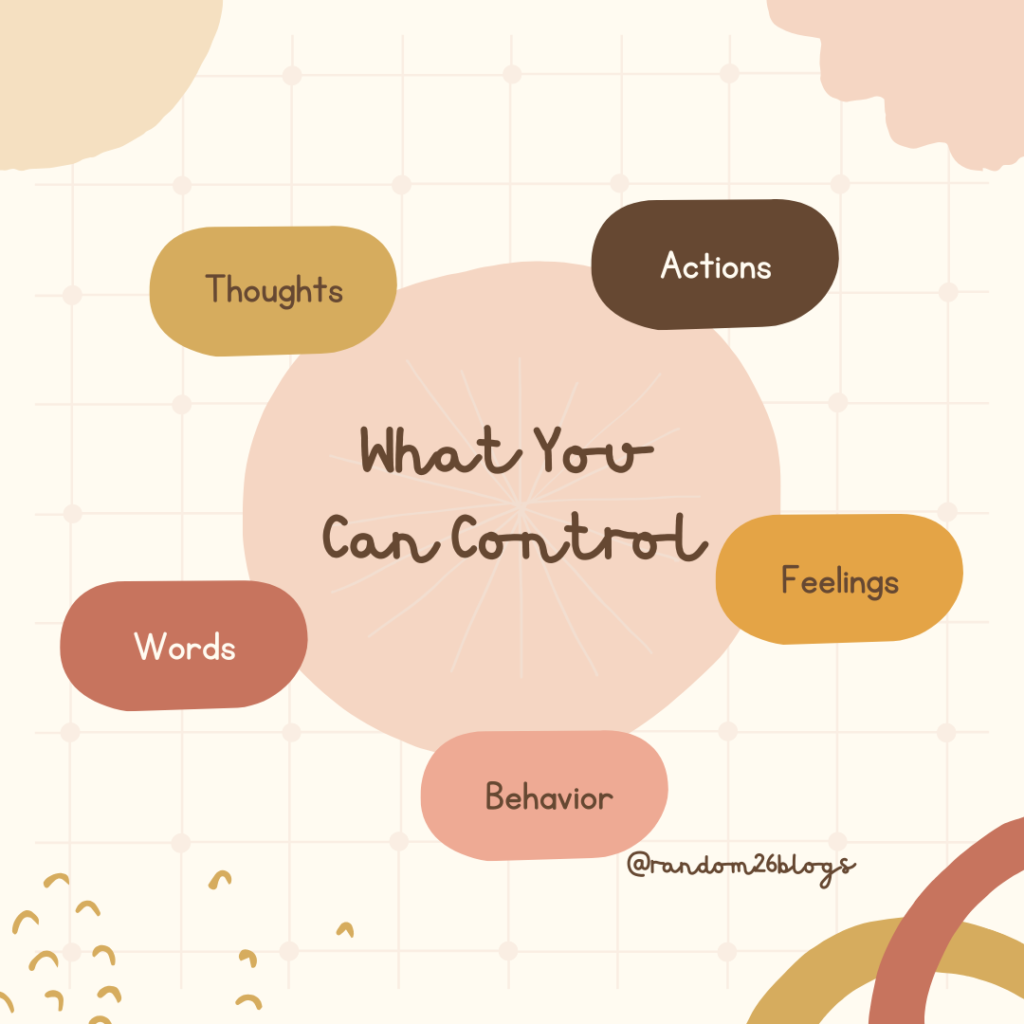
Table of Contents
In our fast-paced world, it’s all too easy to feel swept away by uncertainty, opinions, and outside expectations. Every day, we’re bombarded by headlines, social media feeds, and even well-meaning advice that seem to pull us in different directions. But what if, instead of trying to control everything around us, we turned our focus inward? What if we dedicated our energy to mastering what we can control?

This approach isn’t just about self-preservation; it’s about thriving by grounding ourselves in our thoughts, actions, and how we treat others. By focusing on what we can control, we can cultivate resilience, find inner peace, and ultimately make a meaningful impact on our lives and the world around us.
Why Focus on What We Can Control?
Life presents countless variables: the past, the future, others’ opinions, and our external circumstances. Attempting to manage these can be overwhelming and, more often than not, ineffective. Here’s why grounding ourselves in what we can control is essential:
- Reduces Anxiety and Stress
When we focus on things we can’t control, like others’ perceptions or future uncertainties, it heightens feelings of anxiety. Shifting focus to our own thoughts and actions can relieve this stress, making us feel more empowered and grounded. - Builds Self-Awareness and Intentionality
Focusing on our responses, decisions, and behaviors encourages self-awareness. This deepened understanding helps us make conscious, positive choices rather than reacting impulsively to outside forces. - Creates Meaningful Impact
Although we can’t control external circumstances, our intentional actions can still influence them. By directing our energy toward what we can change—our responses and behaviors—we create a ripple effect that positively affects our relationships, careers, and community.

What You Can Control
It’s liberating to know there are things within our control. Here are some foundational aspects that each of us can focus on, which will lead to more fulfillment and positive influence.
1. Your Thoughts
Our thoughts shape our beliefs, decisions, and actions. While it’s impossible to avoid negative thoughts altogether, we can choose which ones to entertain and act on. Practicing mindfulness, challenging negative beliefs, and focusing on gratitude are powerful ways to shift our thinking. Regular reflection and meditation can also help us become more intentional about our thought patterns.
2. Your Words
Our words have an incredible impact—not only on others but also on ourselves. How we speak, both internally and to others, influences how we feel and act. Kindness, empathy, and positivity in our language can foster stronger connections and reinforce a positive self-image. By choosing our words thoughtfully, we enhance our relationships and set the tone for respectful, constructive interactions.
3. Your Actions
Actions speak louder than words, and each choice we make has a direct impact. While we can’t always control the outcomes, we can control our effort, consistency, and integrity. Whether it’s our work ethic, how we show up for loved ones, or our involvement in the community, focusing on intentional actions allows us to live with purpose and accountability.
4. Your Reactions to Others
We can’t dictate how others act or feel, but we can control our responses. Learning to pause, practice empathy, and choose a calm response instead of reacting impulsively helps us avoid unnecessary conflict and misunderstanding. This skill is especially useful in emotionally charged situations where patience and understanding can lead to more positive outcomes.
5. How You Treat Yourself and Others
Kindness, patience, and forgiveness begin within. How we treat ourselves is often mirrored in how we treat others. Being gentle with ourselves in moments of difficulty or failure cultivates self-compassion, and this mindset extends outward to create more empathy and compassion for others. Building a habit of treating both ourselves and those around us with respect and kindness has the power to create lasting, meaningful relationships.

Shifting Focus to the Present Moment
To truly concentrate on what we can control, it’s helpful to anchor ourselves in the present moment. Living in the past or obsessing over the future drains our energy and diverts attention from the here and now—the only place where we can effect real change.
Techniques for Staying Present:
- Mindfulness Practices
Meditation, deep breathing, and mindful awareness exercises can help calm our minds and keep us focused on the current moment. - Journaling
Reflecting on our day, thoughts, and feelings in writing allows us to process emotions and focus on our priorities without judgment. - Setting Daily Intentions
Start each day by setting a simple intention—whether it’s to be kind, patient, or focused on a particular goal. Revisit this intention throughout the day to stay centered.
Letting Go of What You Can’t Control
It’s easy to fall into the trap of obsessing over things we cannot change: the past, others’ opinions, or potential future outcomes. Learning to let go of these concerns is key to preserving our mental and emotional well-being. Here’s how to start:
- Acceptance
Acknowledge that there will always be things outside of our control. Accepting this reality allows us to free up mental space for what we can influence. - Self-Compassion
Give yourself grace, especially when you make mistakes or experience setbacks. Remind yourself that no one has control over everything, and perfection is neither achievable nor necessary. - Reframing Challenges
Instead of viewing challenges as roadblocks, try seeing them as opportunities to practice patience, resilience, or problem-solving skills. This shift in perspective can make it easier to cope with difficult situations.
How Focusing on What You Can Control Positively Impacts Your Life
Adopting a mindset of focusing on what you can control creates lasting benefits in all areas of life:
- Greater Resilience
By focusing on your responses rather than the circumstances, you’ll bounce back from setbacks with a stronger sense of control and adaptability. - Improved Relationships
Taking responsibility for your actions, words, and reactions strengthens relationships and encourages healthy communication. - Increased Inner Peace
Letting go of the uncontrollable reduces mental clutter, bringing about a sense of calm and focus. - Boosted Productivity and Achievement
With fewer distractions, you can channel your energy into achieving meaningful goals and building habits that align with your values.
Take Charge of Your Life
Focusing on what you can control is not only an empowering practice but a lifelong commitment to self-awareness and growth. While we may not be able to influence every aspect of our lives, we can always control how we show up, how we respond, and how we contribute to the world around us.
Embrace the freedom that comes with knowing you have the power to shape your reality through your thoughts, words, and actions. Let go of the noise, focus on what’s within your reach, and watch how your life transforms for the better.
Every day, commit to grounding yourself in what truly matters and take small, intentional steps toward becoming the best version of yourself. This journey of self-awareness will not only enrich your life but also positively impact those around you. Start today—focus on what you can control and let the rest go.




